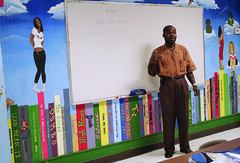Students are able to meet and work with elderly immigrants through the Project SHINE program.
Students have the opportunity to meet people from around the world and do community service through Project SHINE, Students Helping in the Naturalization of Elders. Turning students into teachers, SHINE helps integrate elderly immigrants and refugees through English language and civics education.

SHINE began as a resource for isolated immigrants in 1985, when Nancy Henkin, director and founder of Temple’s Intergenerational Center, read an article about a Hmong woman in Philadelphia who had committed suicide.
“She thought the woman would have had tight-knit family support, but she had no community or family at all,” Jeremy Samsoe, Temple’s SHINE Program Coordinator, said. “SHINE helps people in those circumstances.”
Volunteers tutor senior citizens or assist English as a Second Language instructors as coaches, spending time with people they normally would not, learning about a variety of life experiences and helping newcomers to the U.S. feel more at home.
“I know what being an immigrant is like and how hard it is to learn English,” said tutor Houng “Vivian” Pham, who was born in a refugee camp in Hong Kong and immigrated with her parents nine years ago. “When you teach older people, you help them develop a relationship with our culture, instead of feeling isolated from us.”
Now operating in eight states and 14 cities across the U.S., SHINE has partnerships with various community centers, organizations and 18 colleges and universities.
“Project SHINE is very popular here,” said Ulric Jean Celissaint, ESL instructor at the Indo-Chinese American Council in the Logan section of the city. “We have five or six languages among the students. The most common are Creole and French, Vietnamese, Chinese, Korean and Cambodian.”
“We give them basic things: how to use verbs and form sentences, grammar, show them how to make conversation,” Celissaint added. “Some are looking for a job, want to go to school or get their citizenship.”
“What makes SHINE unique is that it specifically targets adult immigrants because of the struggles of older adults,” Samsoe said. “Some have no education at all. Some [with doctoral degrees] come here and can’t use them. There’s a perception that as an adult, you can’t learn or want to learn or need to learn, so there’s definitely a gap there in education.”
Seniors contribute to the community as well.
“Elders’ impact on the community can be positive and proactive when they’re engaged. They have a lot to offer,” Samsoe said.
For example, there’s “Coffee Cup,” a class at a SHINE site in which Chinese elders tutor students in Mandarin. They also teach traditional Chinese music, calligraphy and a tea ceremony.
“Elders shared their culture and tradition with students, which is a much more traditional role in their culture,” Samsoe said. “It’s about mutual learning.”
SHINE is now a requirement for some Mosaic I classes.
“I’m a social work major, so it’s good to have experience with this population,” said Taisha Shaw, a student tutor. “I’m hoping to understand the immigrant population and ways to better serve them.”
“I’m thinking I want to be a teacher,” Gabriella Salvemini, an English major, said, “so I figured this was the best way to gain experience and get into a classroom.”
“I hope the requirement encourages students to be more involved with the program, not just for their mandatory hours,” Samsoe said. “There have been cutbacks in ESL classes in Philadelphia, SHINE is filling the gaps.”
Project SHINE will recruit again this spring.
Bianca Brown can be reached at bianca.brown@temple.edu.



Be the first to comment